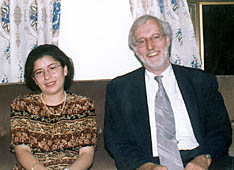
Addressing the Need to Build Democratic Institutions IDEA in Mind [Archives:1998/28/Law & Diplomacy]
July 13 1998
The International Institute for Democracy and Electoral Assistance (IDEA) was formed in 1995 by 14 governments from different continents. The founding members are Australia, Barbados, Belgium, Chile, Costa Rica, Denmark, Finland, India, Netherlands, Norway, South Africa, Spain, Sweden, and Switzerland. In addition some newly-joined members include Canada, Botswana, and Namibia.

Dr. Salah Haddash, Yemen Times Managing Editor, talked to the visitors and filed the following report.
Mr. Roel von Meijefeldt,
International Director of Programs at IDEA:
We provided some ad hoc assistance to some Arab countries, but have not yet developed a systematic cooperation with the democratic institutions in the Arab world. IDEA is not an NGO, but an inter-governmental organization working with NGOs. We aim to engage in further dialogue and to establish relations with the democratic institutions in Yemen and other Arab countries.
We work with governments, political parties – both in and out of power – and with the private sector especially with civil society organizations. There has to be a platform were people can meet.
IDEA does not set up offices around the world, but works with institutions in individual countries. We like to support and facilitate these institutions by providing technical assistance on specific issues relating to democratic developments.
Yemen is a committed democracy facing many challenges. One of the major ones is to strengthen the functions of the democratic institutions. So this needs to be looked into: How can these institutions perform, and how can assistance be provided to increase the capacity of the democratic institutions here in Yemen?
In Yemen, there is a very strong conviction in the process of democracy. This is rather unique, in respect to other discussions we have had around the world where there was the same strong commitment and belief. But here in Yemen, we heard it stated very clearly and very definitively. The desire not to go back on the process of democracy is often repeated.
IDEA has published a handbook about electoral systems, which provides information about all the electoral systems available around the world, including Yemen. The purpose is that people can decide which systems operate where and with what effects. This is very important when electoral systems are being discussed.
The second handbook is about the participation of women in parliament. How can women increase their effectiveness of participation in parliament? This handbook aims to increase and enhance the participation of women in political decision making, specifically in parliament.
A third handbook which will be available very soon is on deep-rooted conflicts. It addresses questions like ‘How societies in conflicts have transformed towards a peaceful management of their public affairs, what are the negotiations and processes, dialogues, mechanisms, what are the constitutional arrangements.’
A fourth handbook is about the issue of the Palestinians and the South Africans. It highlights how these conflicts were slowly transformed into peaceful situations.
We are not ignoring the fact that we cannot take on everything at the same time. That is why we are phasing out our process of involvement. We therefore realize that it would probably be wiser to go into specific countries were there is a very obvious democratic movement, and where the situation is not that complicated.
We would like to share with other countries like Canada, India, South Africa, etc., which are building their democracies, or even in democratic societies which are renovating their institutions. We aim to benefit from the experience of others.
In short, we want to build a platform where people can meet impartially. We are a sort of resource center. It is important to underline that this is a collective effort and not an initiative driven of any particular country.
Dr. Azza M. Karam,
Program Officer at IDEA:
We have chosen to begin our Arab World Program with six countries: Egypt, Jordan, Lebanon, Morocco, Tunisia and Yemen. So far we have visited Egypt, Jordan, Lebanon, and Yemen. The next stage is to visit Tunisia and Morocco.
We are very eager to see how the Yemenis as well as the Jordanians, Lebanese and the Moroccans, perceive democracy. We are very keen to listen and to have a better understanding.
So, during our meetings, we listened to what the Yemenis themselves perceive as their needs in their democratization process.
One obvious need is to strengthen the democratic institutions. The ‘hardware’ is available, so to speak. There is need for developing the ‘software’.
IDEA is an international democracy forum. One of our key activities is an international conference that brings to Stockholm people from different parts of the world. The participants are both governmental as well as non-governmental people who come to discuss a specific theme.
Each year, IDEA adopts a new theme. This year’s democracy forum was on the culture of democracy and the prospects and the obstacles to it. Next year it will be on youth and democracy.
——
[archive-e:28-v:1998-y:1998-d:1998-07-13-p:./1998/iss28/l&d.htm]


